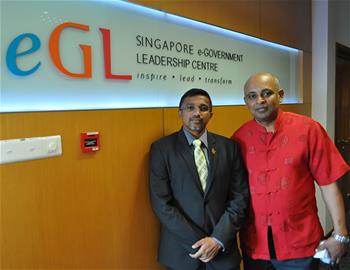The CIO of Maldives’ National Centre for Information Technology, Mr Mohamed Shareef, recounts his recent eGL experience, and the insights that will shape the next stage of e-Governance in his country.
Mr Mohamed Shareef is no stranger to NUS-ISS. The Chief Information Officer of Maldives’ National Centre for IT (NCIT) was here 10 years ago under Ministry of Foreign Affairs’ Singapore Cooperation Programme, and has returned again, this time to eGL for the latest insights on e-Government strategy development.
“Singapore is a real leader in e-Governance,” Mr Shareef said. “The opportunity here at eGL is just so different from other programmes. For example, we learn from experienced practitioners – lecturers with public service background, and veterans who understand the implementation challenges when they teach conceptual frameworks. Putting theories together with industry knowledge – that’s what I liked about the whole experience.”
Although IT principles do not change, the application context certainly has. Mr Shareef found eGL’s User Experience Design (UXD) perspectives to be especially helpful: “Today, the consumerization of technology happens even in small countries, which means that reaching the pinnacle of systems development is not enough”.
According to Mr Shareef, all of NCIT’s senior management team are eGL alumni. He is particularly pleased to have met with local service providers and visited organisations like the National Library Board, which embody effective citizen centricity. “The site visits were impressive, but hands-on interaction with a real sensing of the challenges and practical aspects of effective e-Governance – that’s what real knowledge entails.”
Mr Shareef agreed with the opportunities available for cross learning: “While I learned from Singapore’s e-Government journey, I also exchanged notes with CIOs from 32 participating nations through the workshops and informal sharing. We’ve all come away with something we’ll never find in management textbooks.”

Mr Mohamed Shareef, Chief Information Officer, National Centre for IT, Maldives (left) with Mr Ashok Kumar, Director, Singapore eGovernment Leadership Centre
Improving citizen centricity through the Internet
With a mobile penetration of 180% and the rise of social media platforms like Facebook in the Maldives, Mr Shareef said that the NCIT had been gearing for a higher degree of stakeholder and citizen sentiment management in the implementation of IT.
Currently, the Government Network of Maldives connects nearly half of the country’s inhabited islands to central government agencies in the capital city. As a result, processes such as budgeting and purchasing are now controlled through an integrated financial management system.
Another of NCIT’s key achievements is GEMS, or Government e-Letter Management System, which enables all government offices to exchange communications electronically. In 2013, the Maldivian government saved an estimated $30 million rufiyaa (S$2.48 million) from paper and admin costs alone, excluding other work efficiencies achieved.
Xpat, an online platform for the application of expatriate quota and work permits, has replaced the paper submissions and complicated processes that were previously involved. This has improved transparency on the status of applications and payments without the need for middlemen.
Mr Shareef explained that these initiatives would be further expanded this year. There are plans to build greater robustness into the Xpat system, while the GEMS interface would be made available to all citizens, so that they too, can upload correspondences into the system from their web devices.
As with any transformation initiative, the NCIT is focused on customer education – both citizens as well as government employees – to manage the mindset shift. “The cost and effort per transaction may have gone down, but the number of transactions has gone up. Our preliminary steps may not be sophisticated, but we’re seizing every opportunity to make progressive improvements,” he asserted.
“Shareef’s active contributions and hands-on experience in the implementation of Maldives’ e-Government programmes have benefited all of us in class. We found his strategies to overcome the digital divide and include silver citizens to be very pragmatic, and he has successfully identified and engaged with stakeholders for his agile software development programme, which has yielded positive outcomes. His approach underscores and resonates with eGL’s emphasis on leadership and soft skills as essential attributes for the successful delivery of e-Government initiatives,” said Mr Ashok Kumar, Director, Singapore eGovernment Leadership Centre.
This article is first published in NUS-ISS quarterly e-newsletter, Issue 6 (Apr-Jun 2014).